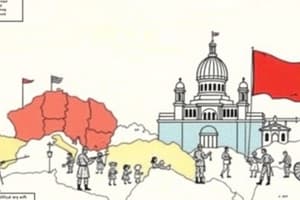Podcast
Questions and Answers
What is the primary focus of historical study?
What is the primary focus of historical study?
- Study of past events, particularly in human affairs (correct)
- Analysis of contemporary political issues
- Prediction of future trends
- Collection of modern artifacts
Which era is characterized by the absence of written records?
Which era is characterized by the absence of written records?
- Middle Ages
- Ancient History
- Prehistoric Era (correct)
- Classical Antiquity
What significant development occurred during the Renaissance period?
What significant development occurred during the Renaissance period?
- Emergence of feudalism
- Rebirth of arts and culture (correct)
- Formation of the first democracy
- Completion of the Industrial Revolution
Which historical theme primarily addresses the evolution of trade practices?
Which historical theme primarily addresses the evolution of trade practices?
Who is often referred to as the 'Father of History'?
Who is often referred to as the 'Father of History'?
What constitutes a primary source in historical research?
What constitutes a primary source in historical research?
What is a key characteristic of contemporary history?
What is a key characteristic of contemporary history?
What does historiography study?
What does historiography study?
Study Notes
Definition of History
- The study of past events, particularly in human affairs.
- Involves the analysis of historical sources and evidence.
Importance of History
- Provides context for understanding present events.
- Helps in recognizing patterns and consequences of actions.
- Fosters critical thinking and analytical skills.
Key Periods in History
-
Prehistoric Era
- Time before written records.
- Studied through archaeology and anthropology.
-
Ancient History
- Includes early civilizations (Sumerians, Egyptians, Indus Valley).
- Development of writing systems, trade, and governance.
-
Classical Antiquity
- Rise of empires (Greek, Roman).
- Development of philosophy, science, art, and politics.
-
Middle Ages
- Feudalism and the rise of Christianity and Islam.
- Cultural and scientific stagnation in Europe, advancements in the East.
-
Renaissance
- Rebirth of arts and culture, emphasis on humanism.
- Innovations in science, literature, and exploration.
-
Modern History
- Industrial Revolution, Enlightenment, and socio-political movements.
- Global conflicts and technological advances.
-
Contemporary History
- Post-World War II developments, globalization, and digital age.
- Ongoing social and political transformations.
Historical Methods
- Primary Sources: Original documents, artifacts, and eyewitness accounts.
- Secondary Sources: Analyses, interpretations, and summaries of primary data.
- Historiography: Study of historical writing and methodologies.
Major Historical Themes
- Social Change: Class structure, gender roles, movements for rights.
- Economic Systems: Evolution from barter to capitalism and beyond.
- Cultural Exchange: Influence of migration, trade, and conquest on cultures.
- Power and Governance: Rise and fall of states, political ideologies.
Notable Historians
- Herodotus: Considered the "Father of History."
- Thucydides: Historian of the Peloponnesian War, emphasized factual accuracy.
- Edward Gibbon: Known for "The Decline and Fall of the Roman Empire."
- Marc Bloch: Pioneer of the Annales School, focused on social history.
Conclusion
- History is a vast field that encompasses a myriad of events, themes, and methodologies.
- Understanding history is essential for comprehending contemporary society and its complexities.
Definition of History
- The study of past events, mainly in human affairs.
- Relies on analysis of historical sources and evidence.
Importance of History
- Provides context to understand present events.
- Helps recognize patterns and consequences of actions.
- Develops critical thinking and analytical skills.
Key Periods in History
- Prehistoric Era: Period before written records, studied through archaeology and anthropology.
- Ancient History: Includes early civilizations like Sumerians, Egyptians, and the Indus Valley, marked by the development of writing systems, trade, and governance.
- Classical Antiquity: Era of the rise of empires like the Greeks and Romans, known for advancements in philosophy, science, art, and politics.
- Middle Ages: Characterized by feudalism and the rise of Christianity and Islam. Europe experienced cultural and scientific stagnation while the East saw advancements.
- Renaissance: A period of rebirth in arts and culture, with a strong focus on humanism. It witnessed innovations in science, literature, and exploration.
- Modern History: Defined by the Industrial Revolution, Enlightenment, and socio-political movements. It saw global conflicts and technological advancements.
- Contemporary History: Covers developments post-World War II, including globalization and the digital age. It continues to witness social and political transformations.
Historical Methods
- Primary Sources: Original documents, artifacts, and eyewitness accounts.
- Secondary Sources: Analyses, interpretations, and summaries of primary data.
- Historiography: The study of historical writing and methodologies.
Major Historical Themes
- Social Change: Includes changes in class structures, gender roles, and movements for rights.
- Economic Systems: Traces the evolution of economic systems from barter to capitalism and beyond.
- Cultural Exchange: Explores the influence of migration, trade, and conquest on cultures.
- Power and Governance: Examines the rise and fall of states and political ideologies.
Notable Historians
- Herodotus: Known as the "Father of History".
- Thucydides: Historian of the Peloponnesian War, famous for emphasizing factual accuracy.
- Edward Gibbon: Famous for his work "The Decline and Fall of the Roman Empire".
- Marc Bloch: Pioneer of the Annales School, focused on social history.
Conclusion
- History is a vast field that encompasses various events, themes, and methodologies.
- Understanding history is crucial to comprehend contemporary society and its complexities.
Studying That Suits You
Use AI to generate personalized quizzes and flashcards to suit your learning preferences.
Description
This quiz explores the fundamental concepts of history, including its definition and significance. It covers key periods such as prehistoric times, ancient history, classical antiquity, the Middle Ages, and the Renaissance, providing a comprehensive overview of historical developments.




